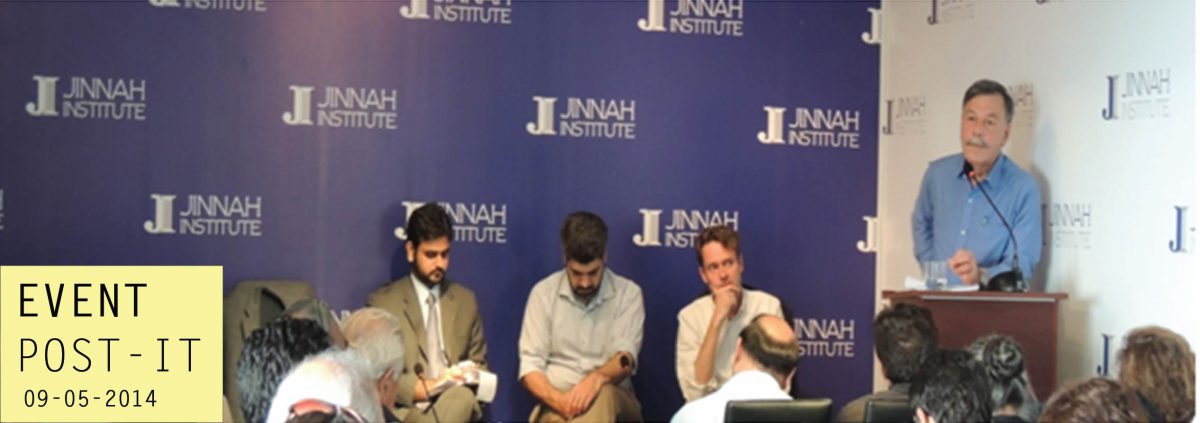Policy Events
Report Launch | Pakistan’s Water Discourse
Date: May 13, 2014
On Friday April 9, Jinnah Institute launched its latest research report “Pakistan’s Water Discourse: Attitudes on Water Management Practices,” to an audience policy stakeholders and members of the civil society.
The report – a perception survey based on consultations with 90 experts from across Pakistan’s four provinces, Azad Kashmir and Gilgit-Baltistan – collated views about the political economy of internal and transboundary water management practices in Pakistan. The research exercise, undertaken in partnership with London-based policy institute Chatham House, was part of a larger ‘South Asia Water Initative’ carried out across Afghanistan, Bangladesh, India and Nepal.
The findings of the Jinnah Institute report were presented by environmental lawyer and report co-author Rafay Alam. Mr. Alam informed those present that while insufficient water storage capacity was cited as having greatly impacted the availability of water, public debate on developing new infrastructure had stalemated in recent years. He explained how the report underscored the limits of state capacity in addressing water-related challenges, underpinned by inadequate social infrastructure, lack of political consensus and financial constraints as the major roadblocks.
Mr. Alam was of the opinion that multiple discourses surrounded water in Pakistan, and that each discourse engendered its own set of politics. Often, the discourse was coloured by a security, technological or ideological lens, while sidelining important debates on environmental flows and even water’s social and cultural significance.
Commenting on the report’s findings vis-a-vis climate change and disaster management, Mr. Alam noted that early warning systems were still not in place. Some water experts had warned that Pakistan should prepare for an ‘environmental disaster’, with the country’s seasonal monsoons shifting away from traditional catchment areas toward Afghanistan. This trend had multiplied the potential for flash floods and erratic rainfall. Mr. Alam also flagged the exclusion of women and gender in water management policies as a source of concern. He concluded by recommending that available and reliable data was vital for informing meaningful policy debate.
On the subject of trans-boundary water sharing, a majority of interviewees felt that while the Indus Waters Treaty (IWT) had stood the test of time and largely served to protect Pakistan’s interests, there was a dire need for a framework or treaty with Afghanistan. However, former Ambassador Shafqat Kakakhel, who was invited to speak on the occasion, said he was distressed to see that a majority of Afghans were not interested in a water treaty with Pakistan.
Ambassador Kakakhel noted that the Jinnah report confirmed concerns about the twin challenges of declining quantity and deteriorating quality of water in Pakistan, and added that the country – like its neighbours – was increasingly ‘water-stressed’. He further explained that per capita availability of water had decreased five times since Partition, mostly due to rapid demographic changes and inadequate policy responses. He ended by calling for greater inter-ministerial and interprovincial coordination on water.
Former governor NWFP and Chairman Water and Power Development Authority (WADPA) Mr. Shams-ul Mulk suggested that all objections on river flow data between provinces should be taken up in the Council of Common Interests (CCI). Mr. Mulk also observed that China had built 22,000 large and small dams in the past 50 years, while Pakistan has been unable to move forward on any of its dam projects.
Jinnah Institute Deputy Director Salman Zaidi, who was moderating the event, spoke about the need for making the water discourse more inclusive by bringing in groups and individuals whose views were often marginalised from policy formulation processes. He noted that the internal water management debate was politically vexed in Pakistan and needed renewed public engagement.
The panel discussion was followed by an engaging Q&A session.
Coverage: The News, Express Tribune, Dawn, Dawn, Daily Times, Pakistan Today, Business Recorder, The Democrate News

